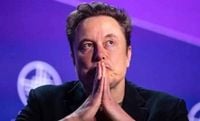In a pointed accusation, Bill Gates has called out Elon Musk for contributing to what he believes are harmful cuts to USAID funding, claiming that such decisions could “kill” children in developing countries, reports the Financial Times. The two billionaires, whose views on philanthropy often clash, are once again at odds—this time over how the world should address global poverty and humanitarian needs.
Gates, in particular, has been vocal about his belief in direct aid programs, while Musk’s priorities lie in advancing technological innovation and the future of space exploration. A disagreement over aid cuts has sparked this latest dispute, stemming from Musk’s influence on government budget decisions, particularly those involving USAID, the U.S. agency responsible for providing foreign aid to developing nations.
Gates contends that cuts to USAID would undermine global health efforts, particularly for vulnerable children who rely on aid to survive. In contrast, Musk has repeatedly argued that innovation, such as advancements in artificial intelligence and space exploration, holds the key to solving humanity’s deepest challenges.
Gates, who has spent decades building his foundation’s global health programs, said that Musk’s stance on USAID funding cuts directly threatens efforts to improve lives in regions of the world where access to basic needs like healthcare and education is scarce. For Gates, the immediate impact of slashing these programs is clear: children in poverty-stricken countries will suffer the most.
While Gates is publicly criticizing Musk, he is also unveiling his grand vision for the future. Recently, Gates revealed his intention to spend $200 billion on philanthropy in the coming years. This initiative will focus on health, education, and sustainable development in impoverished regions. Gates, who has already committed large sums to these causes, emphasized the importance of traditional philanthropy—direct, measurable support for those in need.
In contrast, Musk has often downplayed the significance of traditional aid, arguing that tech-based solutions will bring long-term benefits to the global population. Musk’s approach centers on the idea that humanity should focus on breakthroughs such as space exploration, which he believes will ultimately benefit all people. Gates, however, views this as an insufficient response to immediate needs, particularly in communities struggling with hunger, disease, and lack of access to basic resources.
This disagreement between Gates and Musk is not the first time the two tech moguls have clashed over their differing views on philanthropy. Musk has previously criticized Gates for what he perceives as a narrow approach to giving, while Gates has suggested that Musk’s vision for the future overlooks the needs of the present. Despite their shared wealth, the two have developed competing philanthropic philosophies, with Musk pushing for more futuristic solutions and Gates advocating for grounded, impactful interventions.
Gates has long championed the idea of supporting international development programs that directly address pressing issues like disease and poverty. His foundation has been instrumental in efforts to eliminate diseases like malaria and polio, investing in healthcare initiatives that reach millions. Musk, however, sees these efforts as a temporary fix, preferring to focus on technologies that could fundamentally alter society, including advances in renewable energy and AI.
Meanwhile, for four months, Elon Musk has played an unprecedented role in U.S. government. At the start of his 2025 term, President Donald Trump asked Musk to cut government “waste and fraud.” That translated into the Musk-driven firing of 121,000 federal workers, essentially closing entire government programs and departments. Many Americans protested Musk’s work. His unsupervised access to sensitive government materials and unchecked influence over the firing of federal employees represents an unprecedented moment in the United States.
An unelected billionaire sought to overhaul the federal government, empowered and legitimized not by Congress but only by the president. In 2025, Musk has been the person designated to carry out the president’s aims. In 1910, it was Frederick Cleveland, an academic, who was President William H. Taft’s designated head of his effort to streamline government.
Both presidents, Taft and Trump, have said they wanted to improve how government functioned. But while Taft worked with Congress to launch his effort, Trump hasn’t followed that route. And the men each president asked to lead their efforts were vastly different in the responsibility given to them, and different in values as well as temperament.
Among the many historic attempts by presidents to streamline federal government, Taft’s administration provides a distinct parallel to an administration attempting to make government more efficient. The Taft administration’s early 20th-century equivalent to the Musk-run Department of Government Efficiency, or DOGE, was called the Commission on Economy and Efficiency.
Unlike DOGE, created by presidential fiat via an executive order, Taft’s efficiency commission was funded by Congress. Taft also delegated the work of this reorganization to trusted Cabinet subordinates, rather than an outsider who was not confirmed by Congress. Other presidents of Taft’s generation would have found it unthinkable to delegate such consequential work to someone outside of the bureaucracy to the extent that Trump has empowered Musk.
As head of DOGE, Musk pledged to cut $2 trillion in excess spending, waste, and fraud, but after just 100 days he’s scaling back his role. According to the DOGE website, Musk and his team have so far saved American taxpayers $165 billion, but due to “entrenched set of interests,” the progress has been constrained. On April 30, 2025, Musk spoke from the White House and acknowledged DOGE’s accomplishments but said the advancements could be greater.
Musk will now work one or two days a week at DOGE going forward. The shakeup comes on the heels of Tesla’s stock plunging 71%, leaving many to speculate his position at DOGE is changing to salvage his company. Experts have voiced concerns that Musk’s reduced involvement with DOGE creates a significant leadership vacuum, which could lead to organizational drift.
Melinda French Gates has also weighed in on Musk’s actions, suggesting he should reconsider his approach to foreign aid cuts. She stated, “I would say, before you move on an action, go out and actually see what’s going on in the world today.” Musk’s cost-cutting outfit has laid off thousands of foreign workers and shuttered foreign aid programs, impacting initiatives that provided aid to countries such as Ukraine, Jordan, and Ethiopia.
As Musk continues to navigate his dual roles in philanthropy and government, the implications of his actions will resonate far beyond the boardroom and the White House, raising questions about the future of American foreign aid and the effectiveness of his leadership at DOGE.






